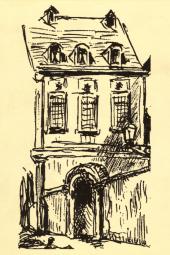The International Union of Academies (IUA) is an international alliance of national academies in the fields of the humanities and the social sciences. Founded in Paris in 1919 with a general secretariat based in Brussels, the UAI at the moment has a membership of more than a hundred academies and learned societies from 63 countries and from all continents. For further information about the International Union of Academies and its supported projects, please visit the IUA website.
In the framework of the partnership between the IAHS and the IUA, two projects are currently under way:
Correspondence of Johannes Hevelius
Description of the project on the IUA website
Description of the project on the IAHS website
Edition of alchemical texts
Description of the project on the IUA website
Description of the project on the AIHS website
STATEMENT OF THE INTERNATIONAL UNION OF ACADEMIES ON THE INVASION OF UKRAINE (March 7, 2022)
The International Union of Academies (UAI, Union Académique Internationale) was founded in 1919, in the wake of the horrors of the First World War, to support and develop international peaceful cooperation between scholars and researchers, and to benefit progress in the study of the human and social sciences.
Given its history, the UAI must condemn forcefully and resolutely the aggression led by Russia against Ukraine. Unleashed by the leaders of the Kremlin and their Belarussian allies, this brutal invasion of a neighbour, with whom it shares a long history, poses a difficult and painful choice to international organisations like the UAI that include among their members academic institutions belonging both to the invaded country, Ukraine, and to the aggressor, Russia.
In addition to its concern for the present and future fate of the Ukrainian population as a whole, caught up in a conflict for which they bear little or no responsibility, the UAI is concerned very specifically about the prospects of the thousands of academic researchers in Ukraine, and about the many academics in Russia (including students and doctoral researchers) who have had the courage to denounce the bellicose rhetoric of a country embarking on a dishonourable conflict. Given the growing level of repression in Russia that is forcing opponents of the government to go abroad, and given the growing number of Ukrainians obliged to flee the war and the violence of the Russian army, the UAI calls on its member institutions to devise programmes that will enable all affected researchers, wherever they are from, to continue their interrupted work and develop new projects.
In this spirit of fraternal cooperation, the UAI adds its voice to those of other universities and research bodies across the world in hoping for an end to these hostilities that, contrary to the free rights of peoples, are causing the massacre of civilians, the destruction of the economic and cultural fabric of a country and the migration of a population. At a meeting of the General Assembly of the United Nations on March 2nd, an overwhelming majority of countries condemned Russia for its repugnant military aggression, and the UAI hopes that this great nation will hear and understand them.
In expressing this wish, the UAI also declares its strong desire to see the continuation of solid relationships and extensive cooperation between institutions across the world, including those in aggressor states, to avoid the growth of intellectual isolation and the emergence of cultural divides between researchers. In the context of international law, the academic principles of peace, freedom, social justice, democracy and solidarity among all must continue to occupy their pivotal place, and continue to bring human beings together, today and above all tomorrow.
